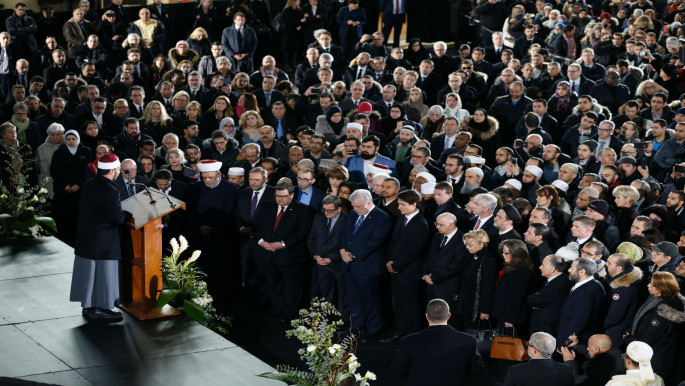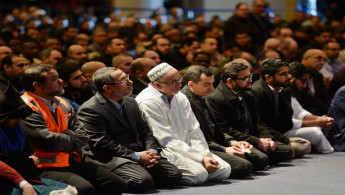Canadians honour victims of deadly Quebec mosque attack
Quebecers have paid their final respects to the six men who were killed when a gunman opened fire into a room full of worshipers at a Quebec City mosque over the weekend.
Thousands of people attended a public funeral service in Quebec City on Friday for Mamadou Tanou Barry, Ibrahima Barry, and Azzedine Soufiane, three of the victims who died in the attack on the Centre Culturel Islamique de Quebec on Sunday.
The funeral was preceded by Friday afternoon prayers at the Quebec City Convention Centre.
“As we chose this country, we want the country to choose us,” said Hassan Guillet, a religious leader and member of the Quebec council of imams, who gave the opening address during the funeral.
“We are citizens like any others, no more, no less. We are reaching out and we ask everyone to extend a hand to us,” Guillet said.
Mamadou Tanou and Ibrahima Barry were good friends, and both came to Quebec from Guinea. Ibrahima, a father of four, will be repatriated to his home country for burial. Mamadou Tanou, a father of two young children, is expected to be buried near Montreal on Sunday.
Originally from Morocco, Soufiane owned a halal grocery store and butcher’s shop. He was a mainstay in the Muslim community in Quebec City, where he had lived for decades.
Hamid Garrouma said Soufiane helped him find his way when he moved to Quebec City from Morocco in 2007. Soufiane was “generous, [had] a big heart, always smiling,” Garouma said. “He was like a guardian angel looking over the mosque.”
The three other men killed during the attack – Khaled Belkacemi, Abdelkrim Hassane and Aboubaker Thabti – were honoured on Thursday in a public funeral service in Montreal. The men’s bodies will be repatriated to their home countries (Algeria and Tunisia) for burial, as well.
“They are stars that will guide us,” Guillet said about the victims.
“We will continue to live in this city. This country is ours. This society is ours, and we are citizens of this country,” he said.
The deadly attack has sparked a public debate in Quebec about anti-Muslim racism and Islamophobia.
 |
|
| A funeral service for the three other victims was held on Thursday and attended by the Canadian Prime Minister [AFP] |
Hate crimes targeting Muslims doubled between 2012 and 2014 across Canada, and community members are calling for greater action to combat hate speech.
“We have to fight against that in this city,” Garrouma said. He said Muslims in Quebec are looking for recognition “that we are Quebecers” and “that we are like everyone else”.
“[We want] recognition that we are really in a country with freedom of expression, freedom of religion,” he said.
Quebec provincial police said it received more than 175 reports of hate speech being posted online since Sunday’s attack, according to the Montreal Gazette. Meanwhile, Montreal police, the SPVM, said 11 hate crimes and 41 hate incidents were reported in the city since Sunday.
A mosque in Montreal was vandalised on Thursday: a brick was thrown through the window at the Khadijah Islamic Centre, and eggs were thrown at the building.
The Quebec City mosque where the deadly shooting took place was also targeted in an Islamophobic attack last year, when a pig’s head was left on its doorstep, alongside a note that read, “Bon appetit!”
On Friday, Quebec Premier Philippe Couillard told reporters that the provincial government would meet with Muslim leaders to discuss security measures, and “make sure that the safety is there” for the community.
But the province must also address systemic issues of racism and discrimination, the premier said, as well as access to employment opportunities.
“Why is it that if someone indicates his name on a CV, and it’s Mohammad, he will never be called for an interview? We have to fix this,” Couillard said.
 |
Vigils have taken place across the country to mourn the deadly attack, and a national day of action to combat Islamophobia is set for Saturday. |  |
“How would you feel… if it was the reverse? If Gerard was a sign of no entry for employment, and Mohammad was, how would we react? Everyone is equal, everyone is an equal citizen, and we have to show it.”
Vigils have taken place across the country to mourn the deadly attack, and a national day of action to combat Islamophobia is set for Saturday.
Protests have also tackled US President Donald Trump’s recent executive order banning immigrants, refugees, dual citizens and green-card holders from seven countries in the Middle East and North Africa from entering the United States.
People from Syria, Iraq, Iran, Yemen, Libya, Somalia and Sudan are affected, and according to the latest information, at least 100,000 people have had visas revoked as a result of the ban.
Earlier this week, hundreds of people gathered in downtown Toronto to protest Trump’s rhetoric and so-called “Muslim ban,” and call on Canada to take concrete action to protect refugees and others that have been impacted.
“For myself as a Muslim, at a time like this, when people are telling me they hate me, people are telling me they’re scared of me, as much as I want to mourn that… I have to take a stand for what I do have and fight back for what I’ve lost and reclaim my humanity,” said a 21-year-old student of Eritrean background, who did not want to give The New Arab her name, during the protest.
She said that while Trump’s rhetoric and actions have caused pain and negativity, there still is “a silver lining of positivity” to be found in how people from diverse backgrounds have come together to fight racism and hatred.
“It’s bringing a lot of people together and we see it in groups like these, we see it with people who may not even believe the same thing as you, but they’re willing to stand beside you, they’re willing to support you,” she said.

![President Pezeshkian has denounced Israel's attacks on Lebanon [Getty]](/sites/default/files/styles/image_684x385/public/2173482924.jpeg?h=a5f2f23a&itok=q3evVtko)



 Follow the Middle East's top stories in English at The New Arab on Google News
Follow the Middle East's top stories in English at The New Arab on Google News


